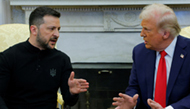Calls for More Regulation As Global Finance Teeters
Just before JPMorgan Chase announced its deal to buy Bear Stearns last month, the chairman of the Federal Reserve, Ben Bernanke, held an extraordinary conference call. The participants were Wall Street’s biggest power brokers and top American government officials.
The purpose of the half-hour session on a Sunday evening was to raise a rallying cry in support of Bear Stearns - and more broadly, the financial markets, which, as it was described on the call, were on the verge of a major meltdown.
“It was much worse than anyone realized; the markets were on the precipice of a real crisis, said one participant. Given that Bear held trading contracts worth $2.5 trillion with companies around the world, “we were talking about the possibility of a global run on the bank.
In another era, the participants in the phone call would have been limited to the exclusive fraternity of high-powered Americans. But this conversation was also filled with accents from beyond the United States - from UBS, Credit Suisse, Deutsche Bank, HSBC and beyond.
While that diversity of voices seemed to take notice of today’s global finance, it was still more of a courtesy to those outside the United States than it was a genuine effort to gather outside views.
The “possibility of a global run on the bank may have been real, but the important decisions had been made long before the folks in London, Dubai and Hong Kong were let in on the plans.
So goes the self-centered world of Wall Street - when it comes to opening up its secret society to foreigners, oddly, doing so is still an afterthought.
But that may not be so much longer. For while America’s top financial officials, from investment houses to government offices, may still have views that are more local than global, there are increasing calls from experts and officials for their vision to broaden.
This is not just a problem in business. The Federal Reserve and the Treasury Department, for example, often check in with their counterparts in other nations. But when they act, their attention is first at home.
One of the participants in that conference call on March 16 was Henry Paulson, the secretary of the Treasury and formerly of Goldman Sachs. He has the power to propose a radical plan to regulate the financial industry in the United States, as he did recently, but that doesn’t address the larger problem: the United States is now so interconnected with the markets abroad, whether it be Japan or even Brazil, that whatever it does on its own is almost beside the point.
“We need much tighter global coordination, Bruce Wasserstein, the chairman of Lazard, said. “It is myopic to look at things in a narrow box. Where we’ve been moving right, the E.U. is moving left. That doesn’t seem sensible.
If the United States, for example, were to limit the amount of leverage - or debt - that investment banks or hedge funds could use, that would not offer any protection from debt-fueled implosions at rival firms abroad.
A blowup at a highly leveraged fund in China would still ripple across the system.
Superleveraged funds have been a major culprit in the latest market gyrations, because their use of debt to increase returns has amplified negative effects. When things go bad, the fallout does not stop at national borders. A fund in London may be connected to another in Thailand and not even know it. Who would have imagined that dentists in Germany owned subprime mortgages in Texas- (They did, or rather, still do - at a huge loss.)
The explosion in the use of financial instruments that balance investors’ risk has only tightened the global links - and made a worldwide meltdown easier to imagine. By using these derivatives, banks and hedge funds across the world are routinely on opposite sides of contracts tied to debt, interest rates or other, more esoteric benchmarks. The collapse of one party (or sometimes just the possibility of a collapse) can be disastrous for the other.
Bear’s downfall will very likely induce new calls to address the unnerving problem of “counterparty risk. To be more than just a public-relations campaign, any such effort will need to have global reach.
In case there’s a question about how interconnected the world really is, just witness the global markets’ near collapse in January when Societe Generale, the French bank, blamed what it said was a rogue trader, Jerome Kerviel, for $7.1 billion in losses. Societe Generale’s efforts to unwind its positions - before announcing them publicly - came close to creating a market panic. George Soros, who was attending the World Economic Forum in Davos, declared at the time: “This is not a normal crisis. It is the end of an era.
The Fed, itself unaware of Societe Generale’s ordeal, felt compelled to lower interest rates. But that didn’t do much, and three months later, the economy is in worse shape.
As Mr. Soros said then, “I question how far the Fed can go given the reluctance of people to hold dollars. In the end, he agreed, there will have to be worldwide regulation of some sort. “The financial system needs a global sheriff.
스마터리빙
more [ 건강]
[ 건강]이제 혈관 건강도 챙기자!
[현대해운]우리 눈에 보이지 않기 때문에 혈관 건강을 챙기는 것은 결코 쉽지 않은데요. 여러분은 혈관 건강을 유지하기 위해 어떤 노력을 하시나요?
 [ 건강]
[ 건강]내 몸이 건강해지는 과일궁합
 [ 라이프]
[ 라이프]벌레야 물럿거라! 천연 해충제 만들기
 [ 건강]
[ 건강]혈압 낮추는데 좋은 식품
[현대해운]혈관 건강은 주로 노화가 진행되면서 지켜야 할 문제라고 인식되어 왔습니다. 최근 생활 패턴과 식생활의 변화로 혈관의 노화 진행이 빨라지고
사람·사람들
more많이 본 기사
- 쿠팡 김범석, 30~31일(한국시간) 연석청문회 또 불출석 의사… “일정 있어”
- 캐나다, 우크라에 18억달러대 추가 재정 지원키로
- 여야, ‘통일교·종합 특검’ 정면충돌 예고…연말연시 대치정국
- ‘6·3 大戰’ 앞둔 대통령실 참모들 시선집중…10여명 출마 거론
- ‘통일교 자금관리’ 한학자 前비서실장 재소환…피의자 전환
- 이이경·조세호 다 떠나고..유재석 곁엔 결국 ‘무도’ 인연이었다
- 뉴욕에 3년만에 최대 폭설…항공기 수천편 결항·지연
- ‘파친코’ 이민진 작가 “맘다니 뉴욕시장, 긍정적 변화 기대”
- 황하나, 남편 사망→캄보디아서 남친과 출산..귀국 후 구속 ‘파란만장’
- [이지 사이언스] “온난화 막으려면 세계인구 44% 식단 바꿔야…문제는 소고기”
- 태국-캄보디아, ‘101명 사망’ 교전 20일만에 휴전
- NASA 신임 국장 “美, 트럼프 임기내 달에 다시 갈것”
- 180일간 김건희만 판 특검 오늘 수사 종료…’V0’ 단죄 성과
- 韓정부, 노란봉투법 해석 지침 공개… 하청 임금·근로조건 좌우하면 ‘진짜 사장’
- 특검, 김건희 ‘금품 수수’ 무더기 기소… 뇌물 여부는 경찰 몫으로
- “트럼프, 29일 네타냐후 회담서 가자휴전 이행문제 제기키로”
- 젤렌스키 미국행… “레드라인 있지만 타협점 찾을 수 있어”
- “아동 수출국 오명 벗는다” 70년 만에 해외입양 중단
- ‘서해 공무원 피격 은폐’ 혐의 서훈… 2
- ‘이강달’ 강태오, 로코 달인은 다르다.. “김세정도 눈빛 좋다고”
- 오윤아 “子, 학교 떨어져 잘못 키웠나..방치 했나 싶어 눈물”
- 쏟아지는 갑질·특혜 의혹… 버티는 김병기, 속 끓는 정청래
- 與 ‘통일교·신천지 특검법’ 발의… 野 “뜬금없다”
- 김정은, 핵잠 이어 미사일 공장도 시… 2
- 한파에 고드름이 주렁주렁… 서울 이번 겨울 첫 한파주의보
- “개인 선정은 SON이 유일?” 손흥민, 축구계 8대 기적 선정이 더 대단한 이유 “퀴라소 월드컵 진출보다 멋져”
- ‘NCT 탈퇴’ 태일, 성폭행 혐의로 결국 감옥行..징역 3년 6개월 확정
- “새해 1호 법안은 2차특검” 정청래, 강경 기조 그대로
- ‘AI 조작 번복’ 폭로자 vs ‘유재석 패싱’ 이이경..하차 잔혹사로 번진 사생활 논란 [2025 연말결산]
- ‘정보 유출자 셀프 조사’ 경찰에 늦게 알린 쿠팡… 증거인멸 의혹
- 올해 美 기업 파산신청 증가… “관세·고물가·고금리 원인”
- IS 확실했나…트럼프 ‘성탄절 나이지리아 폭격’ 갸우뚱
- ‘김건희에 로저비비에 선물’ 김기현 부인 특검 재출석…곧 기소
- “올해 최고 주목받은 테크 거물은 머스크 아닌 래리 엘리슨”
- 뉴욕시 폭설에 항공기 수천편 취소·지연 사태
- LA 등 서부에 사흘째 폭우…동부엔 폭설 예보
- 트럼프 “소말릴란드 아는 사람 있나?”…이스라엘 승인에 ‘NO’
- ‘손흥민 감격의 첫 우승’ 올해 축구계 기적 톱8 선정 ‘선수로는 유일’
- 황하나, 마약 도피 중 캄보디아서 출… 1
- 국제은값 폭등에 개인투자자들 銀투자 대거 유입
- 찰스 3세, 내년 방미 추진…트럼프에 英왕실 ‘매력 공세’될까
- 소싯적 ‘치기어린’ 주소 “굿바이”…지메일 주소변경기능 도입
- 8시즌 뛰고 ML 역대 17위 “오타니 GOAT 될 것”, ML 역대 50인 선정
- 새해 맞아 백만 달러 상금 증정 이벤트와 다양한 설 행사 선보여
- 조지아 역주행 사고, 한인남편 이어 임신 아내도 사망
- 보수 야당 “의원직 사퇴하고 법심판 받아야”…김병기에 총공세
- VA·MD 7명 생굴 먹고 식중독…22개주 60여명 감염
- 물류거점창고에 불체자 8만명 수용 추진
- “솔직히 자신은 없죠” 3루수 GG 송성문, 유격수도 아닌 외야라니... 생존 본능 발동할까
- 오바마케어 가입자수 감소
1/5지식톡

-
 미 육군 사관학교 West Poin…
0
미 육군 사관학교 West Poin…
0https://youtu.be/SxD8cEhNV6Q연락처:wpkapca@gmail.comJohn Choi: 714-716-6414West Point 합격증을 받으셨나요?미 육군사관학교 West Point 학부모 모…
-
 ☝️해외에서도 가능한 한국어 선생님…
0
☝️해외에서도 가능한 한국어 선생님…
0이 영상 하나면 충분합니다!♥️상담신청문의♥️☝️ 문의 폭주로 '선착순 상담'만 진행합니다.☎️ : 02-6213-9094✨카카오톡ID : @GOODEDU77 (@골뱅이 꼭 붙여주셔야합니다…
-
 테슬라 자동차 시트커버 장착
0
테슬라 자동차 시트커버 장착
0테슬라 시트커버, 사놓고 아직 못 씌우셨죠?장착이 생각보다 쉽지 않습니다.20년 경력 전문가에게 맡기세요 — 깔끔하고 딱 맞게 장착해드립니다!장착비용:앞좌석: $40뒷좌석: $60앞·뒷좌석 …
-
 식당용 부탄가스
0
식당용 부탄가스
0식당용 부탄가스 홀세일 합니다 로스앤젤레스 다운타운 픽업 가능 안녕 하세요?강아지 & 고양이 모든 애완동물 / 반려동물 식품 & 모든 애완동물/반려동물 관련 제품들 전문적으로 홀세일/취급하는 회사 입니다 100% …
-
 ACSL 국제 컴퓨터 과학 대회, …
0
ACSL 국제 컴퓨터 과학 대회, …
0웹사이트 : www.eduspot.co.kr 카카오톡 상담하기 : https://pf.kakao.com/_BEQWxb블로그 : https://blog.naver.com/eduspotmain안녕하세요, 에듀스팟입니다…
케이타운 1번가
오피니언

새해 더 중요해지는 노동법 준수

연말연시, 안전하고 차분하게
 캐슬린 파커 워싱턴포스트 칼럼니스트
캐슬린 파커 워싱턴포스트 칼럼니스트 [캐슬린 파커 칼럼] 지미 라이의 마지막 희망
 유경재 나성북부교회 담임목사
유경재 나성북부교회 담임목사 [한국춘추] 미국의 힘
 전병두 서북미수필가협회 회원
전병두 서북미수필가협회 회원 [금요단상] 비자 발급
 박일근 / 한국일보 수석논설위원
박일근 / 한국일보 수석논설위원 [지평선] 스님의 주례사
 신상철 / 고려대 고고미술사학과 교수
신상철 / 고려대 고고미술사학과 교수 [미술 다시보기] 신의 모습을 닮고자 한 예술가
 스티브 강 전 한인민주당협회 회장
스티브 강 전 한인민주당협회 회장 [스티브 강 ‘인사이드 미국’] 2026 중간선거: 트럼프 지지율 하락이 말해주는 것
 김홍일 케이유니콘인베스트먼트 대표
김홍일 케이유니콘인베스트먼트 대표 [기고] 안정의 기준은 어떻게 제도가 되었나
1/3지사별 뉴스

물류거점창고에 불체자 8만명 수용 추진
도널드 트럼프 행정부가 이민자 구금·추방을 효율화하기 위해 전국 물류거점 창고에 8만명 규모의 수용시설 확보를 추진한다고 24일 워싱턴 포스트…
‘학자금 상환’ 안하면 임금압류

“온 세상에 희망·평화의 빛 스며들길”
가자지구와 우크라이나에서의 전쟁, 고립과 불평등으로 세상이 어지러운 가운데 워싱턴 지역 각급 한인교회와 성당들이 성탄절을 맞아 일제히 예배와 …
“연말은 스트레스·새해 결심은 없다”

“올해 최고 주목받은 테크 거물은 머스크 아닌 래리 엘리슨”
올해 미국에서 가장 주목받은 기술업계 거물은 일론 머스크 테슬라 최고경영자(CEO)가 아닌 래리 엘리슨 오라클 창업자·회장이라고 블룸버그 통신…
[새해부터 이렇게 달라진다] 최저임금 또 오르고… 유급 병가는 더 확대

오늘 하루 이 창 열지 않음 닫기 





















































.png)


댓글 안에 당신의 성숙함도 담아 주세요.
'오늘의 한마디'는 기사에 대하여 자신의 생각을 말하고 남의 생각을 들으며 서로 다양한 의견을 나누는 공간입니다. 그러나 간혹 불건전한 내용을 올리시는 분들이 계셔서 건전한 인터넷문화 정착을 위해 아래와 같은 운영원칙을 적용합니다.
자체 모니터링을 통해 아래에 해당하는 내용이 포함된 댓글이 발견되면 예고없이 삭제 조치를 하겠습니다.
불건전한 댓글을 올리거나, 이름에 비속어 및 상대방의 불쾌감을 주는 단어를 사용, 유명인 또는 특정 일반인을 사칭하는 경우 이용에 대한 차단 제재를 받을 수 있습니다. 차단될 경우, 일주일간 댓글을 달수 없게 됩니다.
명예훼손, 개인정보 유출, 욕설 등 법률에 위반되는 댓글은 관계 법령에 의거 민형사상 처벌을 받을 수 있으니 이용에 주의를 부탁드립니다.
Close
x